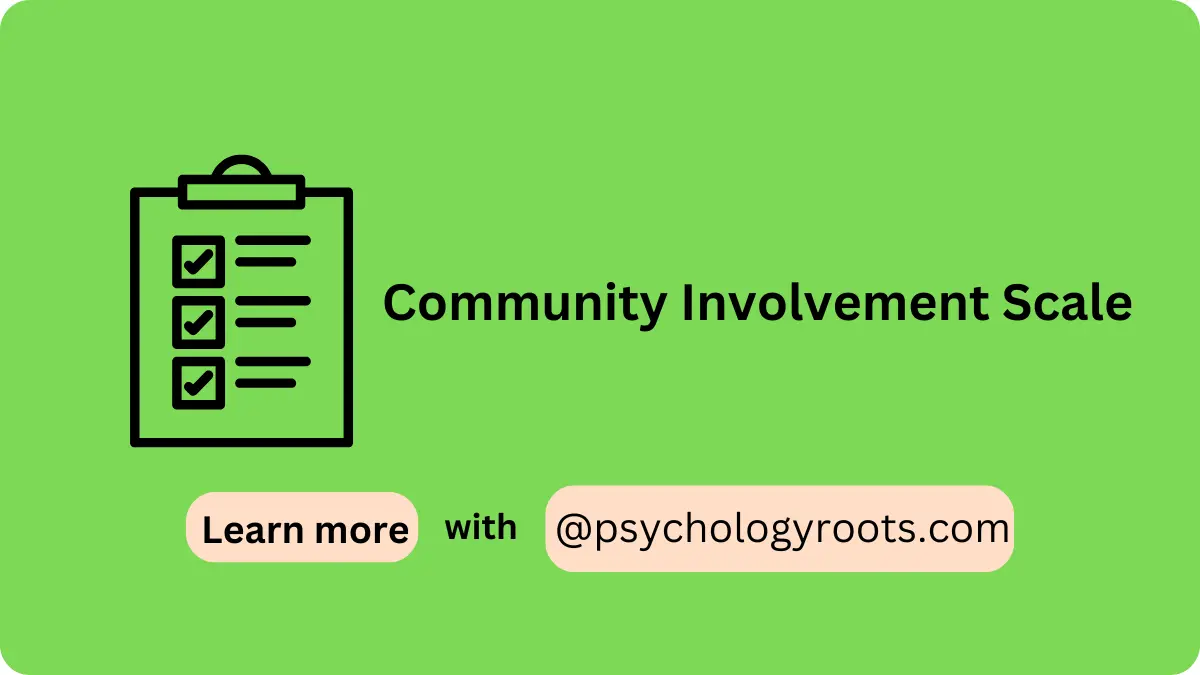Table of Contents
Community Involvement Scale
Here in this post, we are sharing the “Community Involvement Scale”. You can read psychometric and Author information. We have thousands of Scales and questionnaires in our collection (See Scales and Questionnaires). You can demand us any scale and questionnaires related to psychology through our community, and we will provide you with a short time. Keep visiting Psychology Roots.
About Community Involvement Scale
Scale Name
Community Involvement Scale
Author Details
Roy F. Oman, Kenneth R. McLeroy
Translation Availability
English

Background/Description
The Community Involvement Scale assesses the level of pride and willingness among youth to contribute to their community through volunteer work and other prosocial activities. Community involvement is a significant developmental asset linked to positive behaviors, fostering a sense of responsibility, and avoiding negative influences such as delinquency.
This scale is particularly useful for researchers, educators, and program developers aiming to evaluate and enhance youth participation in community initiatives. It targets individuals aged 14–18 years (Grades 8–12) and provides insight into their civic engagement and sense of belonging within their community.
Administration, Scoring and Interpretation
- Target Population: Adolescents aged 14–18 years (Grades 8–12).
- Instructions for Administrators:
- Explain the purpose of the scale in clear and age-appropriate language.
- Provide guidance on selecting responses using the 4-point Likert scale.
- Ensure that participants complete the scale in a quiet and distraction-free environment.
Reliability and Validity
- Reliability: The scale has a good internal consistency with an alpha score of .78.
- Validity: The scale is widely recognized for assessing community involvement and has been used in studies on youth development.
Available Versions
06-Items
Reference
Oman, R. F., McLeroy, K. R., Vesely, S., Aspy, C. B., Smith, D. W., & Penn, D. A. (2002). An adolescent age group approach to examining youth risk behaviors. American Journal of Health Promotion, 16(3), 167-176.
Oman, R. F., Vesely, S. K., Kegler, M., McLeroy, K., & Aspy, C. B. (2003). A youth development approach to profiling sexual abstinence. American journal of health behavior, 27(1), S80-S93.
Important Link
Scale File:
Frequently Asked Questions
Q1: What does the Community Involvement Scale measure?
It measures adolescents’ sense of pride and willingness to engage in volunteer efforts to improve their community.
Q2: Who can use the Community Involvement Scale?
The scale can be used by educators, researchers, and program developers focused on youth development and civic engagement.
Q3: Are there reverse-scored items in this scale?
No, the scale does not include reverse-scored items.
Q4: What does a higher score on the scale indicate?
A higher score reflects greater community involvement and stronger civic responsibility.
Q5: Is permission needed to use the Community Involvement Scale?
No, permission is not required for non-commercial use.
Disclaimer
Please note that Psychology Roots does not have the right to grant permission for the use of any psychological scales or assessments listed on its website. To use any scale or assessment, you must obtain permission directly from the author or translator of the tool. Psychology Roots provides information about various tools and their administration procedures, but it is your responsibility to obtain proper permissions before using any scale or assessment. If you need further information about an author’s contact details, please submit a query to the Psychology Roots team.
Help Us Improve This Article
Have you discovered an inaccuracy? We put out great effort to give accurate and scientifically trustworthy information to our readers. Please notify us if you discover any typographical or grammatical errors.
Make a comment. We acknowledge and appreciate your efforts.
Share With Us
If you have any scale or any material related to psychology kindly share it with us at psychologyroots@gmail.com. We help others on behalf of you.